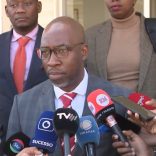Mozambique: IFC pledges to continue funding development projects
Government must spend more on implementing EITI – AIM report

CoM (file photo)
The Mozambican government needs to spend at least a million US dollars a year to implement “perfectly” the Extractive Industry Transparency Initiative (EITI), according to the EITI National Coordinator, Custodio Nguetane.
More than 90 per cent of the costs of implementing EITI have been financed by Mozambique’s international partners, led by the World Bank. The government’s participation in the funding has been tiny, at just three million meticais (about 43,000 dollars, at current exchange rates) a year.
Nguetane provided these figures at a Maputo press conference, after a meeting between Prime Minister Carlos Agostinho do Rosario and the visiting chairperson of the EITI International board, Fredrik Reinfeldt.
Reinfeldt, a former Swedish Prime Minister, took on the position of EITI Chairperson in December 2015.
“Implementation of the initiative is very expensive, particularly the component of publicity”, said Nguetane. “One of our basic elements is that our reports should be accessible to everybody, and particularly to the communities living in areas of mining activity. The component paid by the government is very small, and so greater government participation is required, despite the scarcity of resources”.
A further challenge is for Mozambique to maintain its status as an EITI-compliant country, a status that it has enjoyed since 2012. A reassessment of Mozambique’s status is now due, and will be held in February.
Every country applying to join the EITI as a member is assessed to validate whether it can comply with the EITI Standard. Depending on the outcome of the initial Validation, the country should be re-assessed anywhere between three months and three years later. According to the EITI website, “this encourages continuous improvement and safeguards the integrity of the EITI”.
Nguetane was confident that the re-assessment will go in Mozambique’s favour and that its EITI-compliant status will be reaffirmed.
As for the meeting between Reinfeldt and Rosario, Nguetane said the Prime Minister had reiterated the government’s commitment to continue to implement EITI in Mozambique and to ensure observance of the EITI Standard.
So far Mozambique has published six EITI reports, since it applied to join the initiative in 2009. The next report, carrying data from 2015 and 2016, should be published by the end of this year.
“The reports are very technical”, said Nguetane. “They have to be deciphered so as to be understood at the grass roots, so that communities understand the advantages and disadvantages, the best way of participating, and the factors that make up the entire process of mineral extraction, particularly the component of business social responsibility”.
Reinfeldt said that Mozambique is now at an important moment, since it was being reassessed to see whether its performance is up to the EITI Standard, and to check whether appropriate information is being published and in useful form.
“One of the requirements concerns publication about the entire process to prevent corruption and to understand who are the holders of the mining licences”, he added.
Reinfeldt said it is also important that society understands the content of the contracts signed with mining companies, and EITI must establish whether Mozambique has published the contracts in accordance with the established requirements.
Currently 51 countries are members of EITI. The initiative is intended to set a global standard to promote the open and accountable management of oil, gas and mineral resources. Its declared aim is to strengthen government and company systems, inform public debate and promote understanding in each of the implementing countries.













Leave a Reply
Be the First to Comment!
You must be logged in to post a comment.
You must be logged in to post a comment.